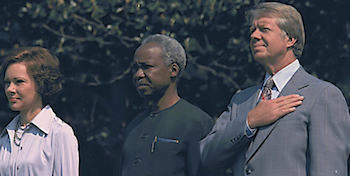Rosalynn, Nyerere, Jimmy Carter during state visit to the U.S. Photo: Karl H. Schumacher
Hunter-Gault: You mentioned the one-party rule in your country, where you ruled, where you were president for four terms, during which time you promoted the principle of Ujamaa, Socialism, you have acknowledged that it was a miserable failure. What lessons in retrospect do you draw from that and the kind of economies that African countries might (more profitably) pursue?
Nyerere: Where did you get the idea that I thought Ujamaa was a miserable failure?
Q: Well I read that you said Socialism was a failure, the country economically was in shambles at the end of the
experiment.
Nyerere: A bunch of countries were in economic shambles at the end of the 1970s, they were not socialist. Now today you need so much courage to talk about socialism, perhaps we should change the phraseology. But you have to take in the values of socialism which were were trying to build in Tanzania. In any society.
Q: And those values are what?
Nyerere: And those values are values of justice. Respect for human beings. Development which is people-centered. Development where you care about the people. You can say leave development of the country to something called the market, which has no heart at all. Since capitalism is completely ruthless who is going to help the poor? And the majority of the people in our countries are poor. Who is going to stand for them? Not the market. So I’m not regretting that I tried to build a country based on those principles. You will have to, whether you call them socialism or not. Do you realize what gave capitalism a human face was the kind of values I was trying to sell in my country?
Q: So what’s the answer, because, with all due respect, the economy of Tanzania did not thrive under the Socialism you practiced. So what do you think is the answer for African economies which is still predominantly poor?
Nyerere: The problem is not a question of socialism. You have to deal with the problem of poverty. You have to deal with the problem of poverty. You have to deal with the problem of poverty in your country, and your country is not socialist….
Q: Or?
Nyerere: Or we are in trouble. People in rich countries don’t realize the responsibility of handling poverty in countries like mine. But those countries will develop. Countries in Africa are poor, those capitalists and socialists—and today we don’t have a single one which is socialist. And they are all poor.
Q: You’ve been critical of some Western countries and their roles in Africa. At the same time you’ve asked Western nations, I think your phrase was ‘clean up the mess in Rwanda and Burundi.’ Can you explain—it sounds like a contradiction.
Nyerere: Well I’m saying some of the problems we are now handling in Africa, mess we are trying to clean up in the continent, we have inherited. The mess of the borders, we have inherited…The colonial powers, and some not colonial powers, have supported regimes which are very corrupt on that continent. I think now they should stop backing up those corrupt regimes and let Africa in her own way try to establish regimes which can care about people. Some of the governments of the West and including the United States, have really been very bad on our continent. They have used the Cold War and all sort of things to back up a bunch of corrupt leaders on our continent. They should stop now, and let the people of Africa sort out together their own future.
Q: Does that include the leader of Zaire (Mobutu at the time)
Nyerere: Well, I didn’t say so….When we have African problems, we ourselves have a duty to solve our problems. We must accept that. African problems, we should try on our own to solve these problems. We would prefer the outside world to keep out. If we want help, we can seek for help. But do you realize sometimes we ask for help and it doesn’t come. On the 5th of last month, our leaders met in Nairobi and said we need an external, we need a force to go into Zaire, to help the refugees, to come back; not happening. And we appealed to the United Nations to establish that force, and we said we would also be participating in that force. Well, quite frankly this is not happening. What is happening is a kind of self-help within eastern Zaire itself and the refugees are going back. I think the lesson that Africa should draw from that is that they should rely upon themselves to the maximum when it comes to dealing with African problems.

